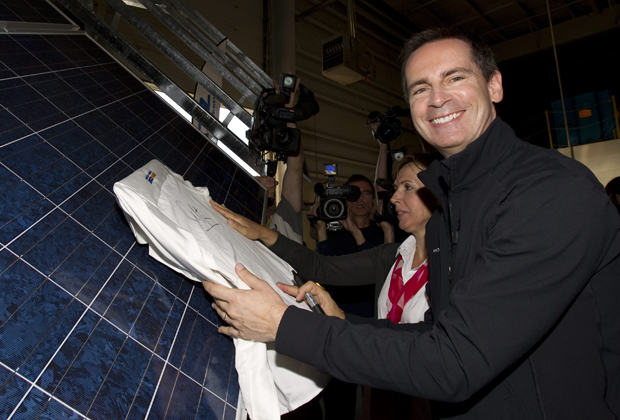OTTAWA – McGuinty’s Liberals won a minority government in the Ontario election, following a campaign filled with dramatic shifts in support from the Progressive Conservatives to the Grits.

Global News spoke with Bryan Evans, a political scientist at Ryerson University, to get his take on the election outcome.
He said economic turbulence played a role in determining the election and it will continue to shape how the Liberals govern over the next four years.
GN: Are you surprised by the results?
BE: There are small surprises, nothing dramatic. The first is how very close the Liberals came to having another majority – only one shy of getting a majority. It’s a function of not getting the breaks in a handful of ridings.
The second surprise is I thought the NDP would do marginally better. I thought 17 was a disappointment for them. That combined with the fact that the Liberals are within a hair of the majority really denies them a lot of leverage they potentially could have had. They really aren’t the king-maker.
The biggest story is the Conservatives snatching defeat from the jaws of victory. A month ago we all kind of concluded that it was highly likely Tim Hudak would be the next premier of Ontario. That clearly will not be the case.
GN: What was at the heart of that? Did McGuinty simply run a better campaign or are voters just sticking with what they know?
BE: Voters were being cautious. The message that we are in unpredictable times, potentially turbulent times, you don’t want to hand over the management of the province to people who have not been in government very long time, if at all. During such times, people tend to be much more cautious. That resonated clearly.
- Trudeau says ‘good luck’ to Saskatchewan premier in carbon price spat
- Canadians more likely to eat food past best-before date. What are the risks?
- Hundreds mourn 16-year-old Halifax homicide victim: ‘The youth are feeling it’
- Vacation death: Cuba apologizes after Canadian family receives wrong remains
On the other hand, I think the Conservatives made a few strategic blunders around the very negative campaign and the deployment of wedge issues, which polarized people. I think that made a sufficient number of people uncomfortable that rather than voting Tory, they voted Liberal.
The other part of it is 52 per cent of the electorate didn’t bother to vote. This is remarkable and really unhealthy for our very limited form of democracy.
GN: What do you think was behind that?
BE: We are witnessing a narrowing of options politically. All of the major political parties, whether NDP, Conservative, Liberal, by and large have very limited visions. There is a general kind of acceptance of the status quo. There are no longer any big projects or any big visions about how to move your country or your province forward in the world. There is a real lack of confidence in our political leadership and our political elite. I think people are just very, very cynical of politics, the style of politics and the content of politics they’ve been given. Consequently, people don’t see the point.
GN: Where does this victory place McGuinty in historical terms for Ontario politics?
BE: You have to go back to pre-WWI to find a Liberal party in government re-elected to a third term. This has not happened since pre-WWI.
The second thing is we haven’t had three back-to-back generations since the time of Bill Davis, which was 30 years ago.
The Liberals will also make history for having to govern in turbulent time. The one thing you can’t say about the McGuinty government is that they’ve come in at an easy time. They’ve have a rough ride since day one in 2003. They inherited a mess from the previous Conservative government in terms of budgetary policy. Then they had to govern during an economically-difficult period, the most difficult period since the 1930s.
Those are all real accomplishments: to win elections during difficult times and to govern in a competent way.
GN: The road doesn’t look like it will get easier for them. What do you think will be McGuinty’s biggest challenges?
BE: Number one, the macroeconomic conditions. We in Ontario and Canada may be moving into – not a year or two-but a decade or maybe longer of tough financial times. That will be difficult to manage politically and economically. They will have a challenge which I wouldn’t wish on anybody.
The latitude to manoeuvre the McGuinty government is going to be really, really narrow. They are going to have to make difficult decisions, strategic decisions about what they can do and what they cannot do in that larger economic context. The room to manoeuvre is really limited because of the deficit.




Comments